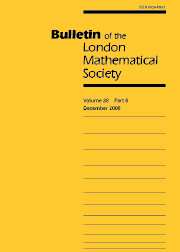No CrossRef data available.
Article contents
OBITUARY NATHAN JACOBSON (1910–1999)
Published online by Cambridge University Press: 23 October 2001
Abstract
Nathan Jacobson, who died on 5 December 1999, was an outstanding algebraist, whose work on almost all aspects of algebra was of fundamental importance, and whose writings will exercise a lasting influence. He had been an honorary member of the Society since 1972.
Nathan Jacobson (later known as ‘Jake’ to his friends) was born in Warsaw (in what he describes as the ‘Jewish ghetto’) on 5 October 1910 (through an error some documents have the date 8 September); he was the second son of Charles Jacobson (as he would be known later) and his wife Pauline, née Rosenberg. His family emigrated to the USA during the First World War, first to Nashville, Tennessee, where his father owned a small grocery store, but they then settled in Birmingham, Alabama, where Nathan received most of his schooling. Later the family moved to Columbus, Mississippi, but the young Nathan entered the University of Alabama in 1926 and graduated in 1930. His initial aim was to follow an uncle and obtain a degree in law, but at the same time he took all the (not very numerous) mathematics courses, in which he did so well that he was offered a teaching assistantship in mathematics in his junior (3rd) year. This marked a turning point; he now decided to major in mathematics and pursue this study beyond College. During his final year at Alabama he applied for admission and financial aid to three top graduate schools in the country: Princeton, Harvard and Chicago. He was awarded a research assistantship at Princeton; after the first year he was appointed a part-time instructor for two years, and during his fourth year he was appointed a Procter Fellow. The stipend was enough to enable him to make a grand tour of Europe by car in 1935, in the company of two Princeton fellow-students at the time: H. F. Bohnenblust and Robert J. Walker.
- Type
- OBITUARY
- Information
- Copyright
- © The London Mathematical Society 2001


